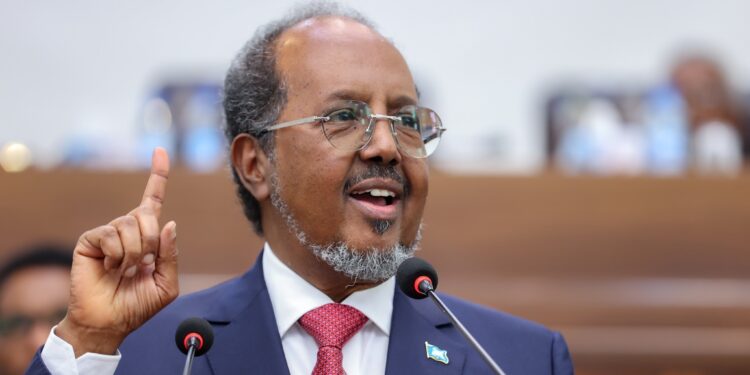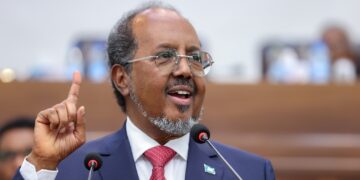Mogadishu, SOMALIA – President Hassan Sheikh Mohamud is reportedly planning to visit Kismayo this week for a meeting with Jubaland President Ahmed Madobe, the very leader he criminalized, deployed troops against, and declared he would never engage with, leaving such matters for his successor. This volte-face, coming after months of systematic assault on Jubaland’s autonomy through constitutional manipulation, military intimidation, and judicial persecution, raises profound questions about whether the president has belatedly recognized the futility of his confrontational approach or is orchestrating another elaborate deception in his increasingly desperate campaign to maintain power beyond constitutional limits.
The timing of this proposed visit following the spectacular failure of federal forces to dislodge Madobe, the latter’s overwhelming electoral victory, and the Federal Government’s cascading losses to Al-Shabab across southern Somalia—suggests a recalibration born more of necessity than conviction. Sources within the president’s inner circle paint a picture of calculation rather than conciliation, with some describing the Kismayo visit as a sophisticated attempt to fracture the emerging alliance between Jubaland and Puntland that threatens to render federal overreach impotent.
President Hassan Sheikh’s track record of political manipulation provides little reason for optimism about genuine reconciliation. This history, examined alongside the current visit’s timing and the whispered strategies emanating from Villa Somalia, suggests that Kismayo may witness not a breakthrough in federal-state relations but another act in the ongoing drama of democratic subversion disguised as dialogue.
Hassan Sheikh’s Modus Operandi
Understanding the Kismayo visit requires examining President Hassan Sheikh’s established pattern of using engagement as a weapon rather than a tool of governance. His political career, spanning two terms separated by five years of opposition, reveals consistent strategies of divide-and-rule, promise-and-betray, and dialogue-and-delay that have characterized his approach to any force capable of constraining executive power. This pattern, refined through repetition and adapted to changing circumstances, provides the interpretive framework for assessing current overtures.
During his first term (2012-2017), Hassan Sheikh perfected the art of fracturing opposition through selective engagement and strategic inducements. Regional leaders who began as critics found themselves isolated after their teams were courted with federal largesse. International partners who raised concerns about governance saw their objections neutralized through carefully orchestrated shows of reform that never materialized into substantive change.
The current term has witnessed these tactics’ evolution from crude co-optation to sophisticated manipulation. The constitutional amendments of March 2024 which extended presidential terms while granting federal control over regional elections were preceded by extensive “consultations” that created impressions of dialogue while predetermined outcomes advanced through parallel tracks. The recent opposition meetings, where the president explicitly stated he would not engage with Madobe or Deni, were themselves exercises in selective engagement designed to isolate the most effective regional leaders while creating appearance of inclusivity.
Regions that challenge federal overreach find their development projects mysteriously delayed, their humanitarian assistance inexplicably blocked, and their international partnerships suddenly complicated by federal objections. This pattern, documented extensively in cases from the African Development Bank road projects to direct aid distribution, reveals how engagement becomes another vector for pressure rather than genuine partnership.
Why Now, Why Kismayo?
The decision to visit Kismayo at this particular moment reveals more about federal desperation than democratic evolution. The spectacular failure of the Ras Kamboni deployment, where 200 federal troops achieved nothing beyond exposing federal impotence has demonstrated that military intimidation cannot dislodge democratically legitimate regional leadership. The growing alliance between Jubaland and Puntland, formalized through the Garowe Declaration, threatens to create an alternative pole of authority that international partners increasingly recognize as more legitimate than federal manipulation. Most critically, the accelerating loss of territory to Al-Shabab while federal forces pursue political vendettas has created pressure even from traditionally supportive international actors.
The visit’s timing also correlates with the approaching deadlines for Hassan Sheikh’s various political schemes. The unconstitutional term extension embedded in the March 2024 amendments requires some form of legitimation through electoral processes. The exclusion of Jubaland and Puntland from these processes creates legitimacy deficits that even manipulated elections cannot overcome. The growing international skepticism about elections conducted without half the country’s participation forces reconsideration of strategies that assumed external acquiescence to internal manipulation.
Kismayo itself represents successful governance that refutes every federal narrative about the necessity of centralized control. The port city’s relative prosperity, security maintained without federal forces, and recent democratic elections that saw incumbent victory through genuine popular support rather than manipulation, stand as living rebuke to Mogadishu’s dysfunction. By visiting Kismayo, Hassan Sheikh enters a space where his failures become visible through contrast with regional achievements.






